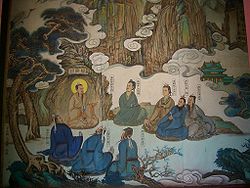- Qiu Chuji
-
 Qiu Chuji (1148 – 1227)
Qiu Chuji (1148 – 1227)
Qiu Chuji (Traditional Chinese: 丘處機; Simplified Chinese: 丘处机 or Qiū Chù Jī; Daoist name: 長春子 or Cháng Chūn Zi; 1148 – 23 July 1227) was a Daoist disciple of Wang Chongyang. He was the most famous[1] among the Seven True Daoists of the North.[2] He was the founder of the Dragon Gate sect of Taoism attracting the largest following in the streams of traditions flowing from the sects of the disciples.
Contents
History
In 1219 Genghis Khan ordered Changchun to visit him[3] in a letter dated 15 May 1219 by present reckoning. Changchun left his home in Shandong in February 1220 and journeyed to Beijing. Learning that Genghis had gone West, he spent winter there. In February 1221, Changchun left, traversing eastern Mongolia to the camp of Genghis' brother Ujughen near Lake Buyur in the upper Kherlen-Amur basin. From there he traveled southwestward up the Kherlen, crossing the Karakorum region in north-central Mongolia, and arrived at the Altai Mountains, probably passing near the present Uliastai. After traversing the Altai he visited Bishbalig - modern Ürümqi - and moved along the north side of the Tian Shan range to Lake Sairam, Almaliq (or Yining City), and the rich valley of the Ili.
From there, Changchun passed to Balasagun and Shu City and across this river to Talas and the Tashkent region, and then over the Syr Darya to Samarkand, where he halted for some months. Finally, through the Iron Gates of Termit, over the Amu Darya, and by way of Balkh and northern Afghanistan, Changchun reached Genghis' camp near the Hindu Kush.
The famous old Taoist monk, Ch'ang-ch'un, had been invited to satisfy the illiterate interest of Genghis Khan in "the philosopher's stone" and the secret medicine of immortality. He explained the Taoist philosophy and the many ways to prolong life and was honest in saying there was no secret medicine of immortality.[1] Chinggis Khan honoured him with the title Spirit Immortal. [2]
Returning home, Changchun largely followed his outward route, with certain deviations, such as a visit to Hohhot. He was back in Beijing by the end of January 1224. From the narrative of his expedition, written by his pupil and companion Li Jichang) we derive some of the most vivid pictures ever drawn of nature and man between the Great Wall of China and Kabul, between the Aral and Yellow Seas.
He is also known for his work Travels to the West of Qiu Chang Chun (Qiu Changchun Xiyou Ji), which details his travels to Central Asia.
Of particular interest are the sketches of the Mongols and the people of Samarkand and its vicinity, the account of the land and products of Samarkand in the Ili Valley at or near Almalig-Kulja, and the description of various great mountain ranges, peaks and defiles, such as the Chinese Altay, the Tian Shan, Bogdo Uula, and the Iron Gates of Termit. There is, moreover, a noteworthy reference to a land apparently identical with the uppermost valley of the Yenisei.
After his return, Changchun lived in Beijing until his death on 23 July 1227. By order of Genghis Khan, some of the former imperial garden grounds were given to him for the foundation of a Daoist Monastery of the White Clouds[3] that exists to this day.
The Seven True Daoists of the North
- Ma Yu
- Tan Chuduan
- Liu Chuxuan
- Qiu Chuji
- Wang Chuyi
- Hao Datong
- Sun Bu'er
References
- ^ a b De Hartog, Leo (1989). Genghis Khan - Conqueror of the World. Great Britain, Padstow, Cornwall: Tauris Parke Paperbacks. pp. 124–127. ISBN 978 1 86064 972 1. http://www.ibtaurus.com.
- ^ a b "Quanzhen Tradition". British Taoist Association. http://www.taoists.co.uk/quanzhen.htm.
- ^ a b Li, Chi Ch'ang. "1220 - 1223 : The Travels of Ch'ang Ch'un to the West". http://depts.washington.edu/silkroad/texts/changchun.html.
- E. Bretschneider, Mediaeval Researches from Eastern Asiatic Sources, vol. i. pp. 35-108, where a complete translation of the narrative is given, with a valuable commentary
- C. R. Beazley Dawn of Modern Geography, iii.539.
 This article incorporates text from a publication now in the public domain: Chisholm, Hugh, ed (1911). Encyclopædia Britannica (11th ed.). Cambridge University Press.
This article incorporates text from a publication now in the public domain: Chisholm, Hugh, ed (1911). Encyclopædia Britannica (11th ed.). Cambridge University Press.
External links
- The Perfect Man of Eternal Spring Qiu Chuji
- Introduction to Quanzhen Daoism and the Dragon Gate Tradition
- Journey to the West of the Perfect Man of Eternal Spring
- Qiuchuji complete biography in qiuchuji.org
- The Travels of Ch'ang Ch'un to the West, 1220-1223, recorded by his disciple Li Chi Ch'ang, translated by E. Bretschneider (includes a translation of Genghis Khan's letter of invitation)
Preceded by::
Liu ChuxuanHead Daoist of Quanzhen
?-1227Succeeded by::
Wan ZhipingCategories:- 1148 births
- 1227 deaths
- 13th-century explorers
- Song Dynasty Taoists
- Yuan Dynasty Taoists
- Taoist religious leaders
Wikimedia Foundation. 2010.

